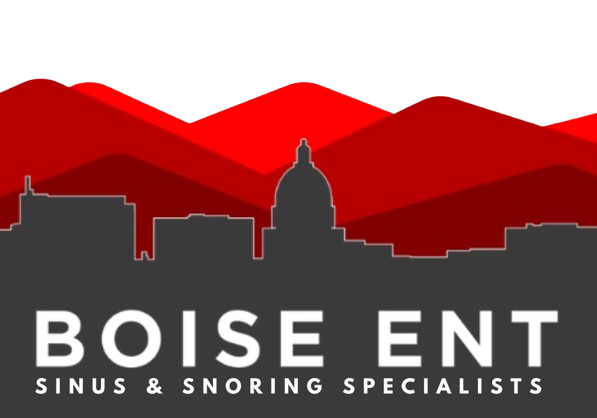We all know the misery of sinus pressure, a stuffy nose, or post-nasal drip. But…

Do You Have a Deviated Septum?
Signs Of A Deviated Septum
A deviated septum is the term used for when the thin wall located between your two nasal passages in the center of your nose is pushed to one side. While there are some people who have crooked noses with a deviated septum, you cannot simply determine if you have one by looking at your nose. In many cases, you cannot visually tell at all if you have a deviated septum. Here at Boise ENT, we have helped many patients who are dealing with a deviated septum through different effective techniques. So, how do you know if you have a deviated septum? There are a number of signs to watch out for that can indicate you may be suffering from a deviated septum:
- Nosebleed
- Sinusitis
- Facial pain
- Snoring
- Obstruction of one or both nostrils
- Noisy breathing during sleep
- Nasal congestion
- Sleeping only on one side
- Difficulty breathing through the nose
How to Tell If You Have A Deviated Septum
If you are experiencing any of the above symptoms, it could mean you have a deviated septum, or it could be pointing out a different sinus issue. Either way, it is worth it to book an appointment with an ENT specialist near you to get to the bottom of the problem and determine some treatment options. Let’s take a closer look at the signs of a deviated septum.
Frequent Nosebleeds
Deviated septums can cause frequent nosebleeds because the septum that is misaligned ends up getting drier than normal. As the air passes through the nasal passage, it does not pass smoothly due to the septum being out of place. This causes it to become dry and sore, which can lead to these nose bleeds.
Sinusitis
Another common symptom that can be caused by deviated septums is sinusitis, or an inflammation of the sinuses. Because of the uneven airflow caused by the septum being out of proper alignment, it can interfere with how well the mucous membranes of the sinuses are able to drain. If they cannot drain properly it can cause germs and bacteria to take hold which can lead to sinusitis.
Headaches or Facial Pain
Another common sign of a deviated septum is facial pain or even headaches. There is some debate about why a deviated septum can cause facial pain, but there is some belief that in severe cases the septum can actually push on the nasal wall and cause pressure.
Snoring or Trouble Sleeping
Snoring is one of the most common signs of a deviated septum. Because of the misalignment of the septum it changes the airflow into the nose and respiratory system, this can result in a vibration of the respiratory structures, also known as snoring. Because of the symptoms that are caused by a deviated septum, you could have trouble sleeping. If you have trouble breathing or a constantly runny nose, it will simply not allow you to get a good night’s rest.
Frequent Cold Symptoms or Runny Nose
You may feel like your nose is constantly plugged up. This can lead to sinus problems, including sinus infections. Many people with a deviated septum also complain about constant nasal drip. If you suddenly find yourself with a constantly runny nose that does not go away with cold medicine, you could be experiencing the symptoms of a deviated septum.
Trouble Breathing
If the septum is not lined up properly, you may have difficulty breathing. Breathing through one nostril may be the norm for you, but you will breathe better if both are working properly. This, of course, can get much worse when you have a cold or allergy symptoms.
Contact An ENT Specialist Near You in Boise, ID About Your Deviated Septum
If you believe that you might have a deviated septum and are experiencing any of the above-mentioned symptoms that simply will not go away, you may wish to seek professional help. A deviated septum can quite often be treated with medications, including decongestants, antihistamines, or steroids.
However, if your deviated septum is not alleviated with them, you may need to have surgery to correct the problem. An experienced ENT near you will be able to determine if you do have a deviated septum and the best course of action to get relief. Contact our experts today to receive immediate treatment: Schedule an appointment online or call our office at (208) 229-2368



